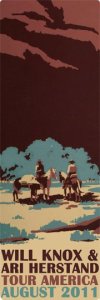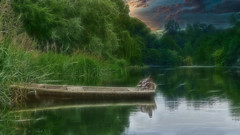Here are the interviews done with Johannes Oerding, WellBad, Rob Longstaff and Celina Bostic. German and English versions available.
Johannes Oerding – English translation:
What are your influences and inspirations as a songwriter?
J: It varies. I’ve always played music, played around on the guitar and my parents had an untuned piano standing around so that way I taught myself to play an instrument. I’ve also always listened to a lot of music, that’s how melodies develop. In the past I listened to Stevie Wonder and various singers/songwriters so the stories I’m telling are, in terms of content, like a diary. It’s things that I need to write down but I can’t do that in a diary, I need to do that with a song.
Which artists, musicians or not, inspire you? You mentioned Stevie Wonder, so I mean both old-established and newer ones.
J: I listen to music in a very song-oriented way, meaning, I don’t listen to one specific genre or artist but instead it can be a song that’s played on the radio that I like, it can even be a piece of electronic music, a rock song, various artists…the guys that played today really inspired me, the other bands, and that’s just wicked. It’s always nice to see different influences, go to other concerts and that’s why you’ll find many different genres on my iPod. You will find old soul classics such as Stevie Wonder or Marvin Gaye but also new artists so there might be a song by Andreas Bourani, Jupiter Jones or something that’s really strange. It’s the individual song that’s gotta move me.
What are some of your personal favourites, and not just favourite singers but also among your own songs? Something you think you’ve done a good job on.
J: Actually, there’s a singer in Germany who, to my mind, could sing the phone book and that’s Xavier Naidoo, whose voice is very impressive. Except for his lyrics maybe, because sometimes the lyrics or contents are just not my cup of tea but I think, when he raises his voice, when he sings, it’s just really impressive and one can take him as an example. I recently did some concerts with him, as a supporting act, and to see that up close is very impressive. I admire him and bow to him.
From my own songs? I like the last one I played tonight, “Zurück” (“Back”), very much. It’s one of my favourites that you can just play with a guitar or with the whole band. It just sounds good, is fun and always has something special to it.
Unlike some artists that played Sofar you’ve got a record deal. Most of them play smaller gigs, in pubs and so on. So, what’s your view on the music business?
J: Let’s start the other way around: I did all of that myself, played in smaller pubs and clubs and that’s part of it because it helps you get a feeling for the audience, for your songs and your live performances. My view on the music business is that, from a certain point onwards, it does make sense to work with bigger partners, especially if you wish for your music to reach a lot of people. It’s often the artists’ way to start with their own label, then move on to a small label and then a bigger label takes notice of them and says, come on, we can work with you, maybe we can get you to play in bigger venues and help you make your record and another one as well. It costs a lot of money to produce a record and if you don’t have that money yourself you simply need people who can support and help you. That’s why I actually have a very good opinion of record companies, most of them anyway. Of course there are plenty of black sheep and there’s lots of extremely unhappy artists. As yet, I am very pleased with the work, that can always change, but for now everything is going well and I am very happy. I can do a lot of things myself and no one’s butting in. That was my condition, in order to make music or sign a record deal.
Especially when it comes to lyrics, when you write your own songs you don’t want anyone butting in because it goes against your own ideas.
J: Exactly and that was a condition right from the start when I signed the record deal, major label, that I would be able to make my CDs the way I make them, then give it to you [label] and then we can release it somehow. When it comes to my lyrics I don’t want anyone changing anything. Not me, not my music, and they don’t do that.
Nowadays the internet is the way to help your music reach people and a lot of artists offer free downloads of some of their songs. What do you think of the internet in this respect?
J: There is a standard response here, namely that the internet is both, it’s good, it’s bad. It’s to be cursed but it’s also a blessing. If you’re an unknown artist then you can really use the internet to become a talking point, to make your stuff public and lay the groundwork.
On the other hand the internet managed to extremely lessen the value of music for the users, for the people out there, especially when it comes to CDs or any cut musical work. If you really want to, you can get anything for free and that’s a real shame if you think about it. For example, In the past you had to sell 200.000 records for a gold disc, nowadays you only have to sell 100.000 because so little is generally being sold. In my mind, that’s because there is no more appreciation for the simple reason that you can get it all for free. People say to themselves, why would I buy this? That’s just what the curse is, what the music industry suffers from and will continue suffering from for a very, very long time.
The upside is that live music remains the same and people still want to see artists live and since I always played live music and always toured, things are actually ok for me. I can always play live, have my gigs, my clubs, my tours and people always come, which is great of course.
You mentioned gigs, now that you’ve played something intimate such as Sofar, what do you prefer? Big concert halls or something small?
J: To be perfectly honest, I do prefer it when there’s a lot of people in the audience. This weekend I played in front of 17.000 people and once you’ve experienced that, it does shock you and so my first answer would always be: I like it better to play for as many people as possible because it’s kinda more fun. But then I come here today and you sweat like a pig and you see the people right there and they all join in regardless and listen, and that’s an intimate moment. So there’s a standard answer really: it both has its appeal and I think it’s nicer for the fans, the audience, the smaller it is. For us on the stage it’s sometimes just really wicked to play in front of thousands of people and they all sing along to your songs. Playing in front of so many people also means that there’s a bigger chance that a lot of them will come back and that’s why you like doing this.
Full band or acoustic?
J: I actually prefer playing with my boys because that’s where it kinda comes from, to play music with others, live on stage. That was a reason why I wanted to make music because it’s such fun to do this with other people. So I prefer having my boys along with me, because we’ve come to be relatively well attuned in the last four to five years. Of course it’s possible to perform alone, that’s also nice, but I like it better with my boys, when we’re on the road, touring and such, it’s just like a school trip.
What about artists that you’d like to work with?
J: Xavier Naidoo. There are so many great artists that you could work with. If I’d think internationally, I really like P!nk very much and to do an acoustic gig with her, I’d love that. If you hear P!nk sing just with a guitar, it’s incredible, it blows you away. It’s a voice that you discern among a million voices and that’s just wicked.
Johannes Oerding – Originalfassung auf Deutsch:
Was sind deine Einflüsse, was inspiriert dich dazu Musik zu schreiben?
J: Es ist ganz unterschiedlich, also ich hab immer schon ein bisschen Musik gemacht, so auf der Gitarre rum geschrabbelt und auch zuhause bei meinen Eltern stand immer ein verstimmtes Klavier rum. So hab ich mir das irgendwie erst mal selbst beigebracht ein Instrument zu spielen und ich hab immer viel Musik gehört, die Melodien sind so entstanden. Ich hab früher Stevie Wonder und solche Sachen gehört oder auch viele Singer/Songwriter und diese Geschichten, die ich erzähle, also inhaltlich sind das einfach so Sachen wie ein Tagebuch, die man aufschreiben muss, die man irgendwie so…ich kann das halt nicht in einem Tagebuch, ich muss das eben mit einem Lied machen.
Welche Künstler, Musiker oder nicht, inspirieren dich? Du erwähntest ja Stevie Wonder, also von Alteingesessenen aber auch neueren!
J: Mittlerweile höre ich total Song-bezogen, also ich hör nicht ein Genre oder einen Künstler, sondern wenn mir im Radio auch ein Song gefällt oder so, das kann ein Elektrostück sein, das kann ein Rockstück sein, es kann irgendwie ein anderer Künstler sein…auch heute haben mich die Jungs so inspiriert, die anderen Bands, das fand ich ganz geil. Das ist immer schön immer wieder andere Einflüsse zu sehen und auf andere Konzerte zu gehen und deshalb sind auch in meinem iPod ganz verschiedene Genres drauf, also da können wirklich die alten Soulklassiker von Stevie Wonder oder Marvin Gaye drauf sein, aber eben auch neue Künstler und da kann dann auch mal ein Song von Andreas Bourani, Jupiter Jones oder eben auch was völlig stranges. Der einzelne Song muss mich irgendwie berühren.
Persönliche Favoriten, und zwar irgendein Lieblingssänger, den du total magst, aber auch ein Favorit unter deinen eigenen Liedern. Etwas, das dir deiner Meinung nach am besten gelungen ist.
J: Es gibt tatsächlich auch in Deutschland einen Sänger, der meiner Meinung nach auch das Telefonbuch rauf und runter singen kann und das ist Xavier Naidoo, den ich von seiner Stimme her sehr beeindruckend finde. Abgesehen von den Texten, manchmal sind das nicht meine Texte oder meine Inhalte, aber ich finde, wenn der seine Stimme erhebt, oder wenn der singt, also das ist wirklich schon beeindruckend und irgendwie auch, ja, also kann man schon als Vorbild nehmen. Ich hab mit ihm auch letztens support gespielt, paar Konzerte gespielt, und da konnte man das auch aus nächster Nähe sehen, das war schon irgendwie sehr beeindruckend. Den verehre ich, da verneine ich mich vor. Und von meinen Songs? Ich mochte den, den ich heute gespielt habe, den letzten Song, „Zurück“, sehr sehr gerne. Das ist einer meiner Favoriten, den kann man nämlich nur mit Gitarre einfach spielen, der klingt gut, den kann man mit der ganzen Band spielen, der klingt gut, macht Spaß und irgendwie hat der immer was besonderes.
Und du hast ja einen Plattenvertrag, aber manche Künstler die bei Sofar spielen haben halt keinen und spielen eher so kleinere Gigs, in Pubs usw. Was ist also deine Meinung zur Musikindustrie?
J: Anders herum angefangen, ich hab das auch alles schon mal gemacht, ich habe auch in kleinen Kneipen angefangen zu spielen und in kleinen Clubs oder so und das gehört einfach dazu, um irgendwie ein Gefühl dafür zu kriegen, für ein Publikum und für seine Songs und seine Live-Veranstaltungen. Meine Meinung zur Musikindustrie ist, dass es ab einem gewissen Punkt schon auch Sinn macht mit größeren Partnern zusammen zu arbeiten, wenn man den Wunsch hat, dass es viele Leute erreichen soll. Es ist ja auch oftmals der Weg von vielen Künstlern, dass sie erst ein eigenes Label haben, dann vielleicht ein kleines Label und dann werden große aufmerksam und die sagen dann, komm, wir können mit dir arbeiten, wir können es vielleicht auch schaffen, dass du in größeren Hallen spielst, dass du vielleicht deine Platte, noch eine Platte, machen kannst usw. Das kostet ja auch immer Geld, also um so eine Platte zu produzieren kostet viel Geld und wenn man das selber nicht hat, dann braucht man halt eben auch Leute, die einen unterstützen und helfen. Deshalb hab ich eigentlich eine sehr gute Meinung zu Plattenfirmen, also zumindest zu einigen. Es gibt auch viele schwarze Schafe und es gibt auch viele Künstler, die sind extrem unzufrieden. Ich sag mal, noch bin ich sehr zufrieden mit der Arbeit, das kann sich ja auch irgendwann ändern, aber im Moment läuft alles super und ich bin sehr glücklich. Ich kann sehr viel selber machen und mir redet da auch keiner rein. Das war aber auch eine Bedingung von mir, um Musik zu machen, oder einen Plattenvertrag zu unterschreiben.
Vor allem was Liedtexte angeht, wenn man seine eigenen Lieder schreibt, da will man ja auch nicht, dass sie einem reinreden, denn das geht oftmals völlig gegen die eigenen Vorstellungen.
J: Genau, und das war ne Bedingung von Anfang an, als ich den Plattenvertrag Major Label, unterschrieben hab, dass ich meine CDs mache so wie ich die mache und dann geb ich die euch und dann können wir die irgendwie rausbringen. Aber mit den Texten will ich nicht, dass da jemand rum schraubt. An mir nicht und auch an der Musik nicht und das machen die nicht.
Thema Internet – das ist ja mittlerweile der Weg, um Musik an die Leute zu bringen und viele bieten ja auch umsonst Downloads von einigen ihrer Lieder an. Was hältst du vom Internet diesbezüglich?
J: Da gibt es echt eine Standardantwort drauf und die ist, es ist halt beides, es ist gut, es ist schlecht. Es ist zu verfluchen, aber es ist auch ein Segen. Also wenn man natürlich ein unbekannter Künstler ist, kann man natürlich dieses Internet extrem nutzen, um von sich reden zu machen, um seine Sachen erst mal bekannt zu machen und irgendwie eine Basis aufzubauen.
Andererseits hat das Internet dafür gesorgt, dass Musik bei den Usern, bei den Leuten da draußen, extrem an Wert verloren hat und gerade eben was eine CD anbelangt oder eben gepresstes Musikwerk. Also man kriegt ja auch alles umsonst wenn man es will und das ist schon echt schade, wenn man sich das überlegt. Ein Beispiel, früher musstest du 200.000 Platten verkaufen für ne goldene Scheibe und heute musst du nur 100.00 verkaufen, weil einfach so wenig verkauft wird. Das liegt meiner Meinung nach daran, dass eben diese Wertschätzung nicht mehr da ist weil es das eben umsonst gibt. Da sagt sich jeder, warum soll ich mir das denn kaufen? Und das ist halt echt der Fluch an der ganzen Sache, wo die Musikindustrie krankt und auch noch sehr, sehr lange kranken wird.
Was schön ist, ist, dass Live Musik halt immer da bleibt wo sie ist und Leute wollen nach wie vor immer Künstler live sehen und da ich immer Live Musik gemacht hab und immer viel unterwegs war, ist das für mich eigentlich alles ok, also ich kann immer live spielen, immer, meine Auftritte, meine Clubs, meine Touren, und die Leuten kommen und das ist natürlich super.
Wo du von Konzerten sprichst, jetzt wo du auch etwas intimes wie Sofar erlebt hast – was ist dir persönlich lieber? Große Hallen zu spielen oder so etwas kleines?
J: Ich muss ganz ehrlich sagen, ich mag das schon lieber, wenn ganz viele Leute da sind, also ich hab jetzt am Wochenende vor 17.000 Leuten gespielt und wenn man das erlebt hat, das schockt schon ganz schön und meine erste Antwort wäre immer: ich mag das einfach vor möglichst vielen Leuten zu spielen, weil mir das irgendwie mehr Spaß macht. Dann komm ich aber heute hier wieder hin und man schwitzt wie Sau und man sieht die Leute da alle und die machen trotzdem mit und hören zu und das ist ein intimer Moment. Dann gibt es wirklich nur diese Standardantwort: es hat beides seinen Reiz und ich glaube für die Fans, für die Zuhörer, ist es toller je kleiner es ist. Manchmal es ist für uns auf der Bühne aber auch richtig geil zu sehen, wenn man vor vielen tausend Menschen steht und die singen dann deine Songs mit. Das bedeutet halt eben auch, wenn du vor vielen Leuten spielst, dass halt eben die Chance auch größer ist, dass viele wieder kommen und deshalb macht man das auch gerne.
Full Band oder Akustik?
J: Eigentlich spiel ich lieber mit meinen Jungs zusammen, weil das ist es woher das auch ein bisschen kommt, mit anderen Leuten Musik zusammen zu machen, aktiv auf der Bühne. Das war immer so der Grund warum ich Musik mache, weil das so einen Bock macht mit anderen Leuten Musik zu machen. D.h. am liebsten hab ich schon meine Jungs dabei, weil wir mittlerweile, auch echt seit vier bis fünf Jahren, relativ eingeschworen sind und irgendwie eine gute Familie sind. Klar, es geht auch immer, dass man alleine auftritt, das ist auch schön, aber ich mag das lieber mit meinen Jungs, wenn wir unterwegs sind, auf Tour und so, das ist einfach wie Klassenfahrt.
Künstler, mit denen du gerne was machen würdest?
J: Xavier Naidoo. Es gibt so viele tolle Künstler, mit denen man was machen würde. Wenn ich jetzt international denken würde, ich mag P!nk z.B. sehr gerne und wenn man da mit P!nk irgendwann so einen Akustik Gig zu zweit machen würde, das würde ich schon extrem abfeiern. Wenn man P!nk auch nur mit einer Gitarre singen hört, das ist unfassbar, das bläst einen einfach weg. Das ist eine Stimme, die hört man an 1 Mio Stimmen raus und das ist halt extrem geil finde ich.
WellBad – English translation:
What‘s influencing you guys in your songwriting?
Daniel W.: I think it’s like Willie Dixon once said: The Blues is the roots, everything else is the fruits. Somehow everything comes from the Blues and that’s an attitude towards life.
Specific artists that you can think of that inspire you?
Daniel W.: Tom Waits is just wicked. He is (pointing to bandmate Nazim Kilic) a Jimi Hendrix fan, you can tell from his tie, which he’s wearing around his head…and sometimes from his guitar play.
Nazim: On a good day.
Well, he could do worse couldn’t he? I mean…Jimi Hendrix!
Daniel W.: Yeah, I think so too. So, something of Tom Waits, psychedelic, Jimi Hendrix.
With regard to your own songs, what would be a favourite?
Daniel W.: I really like “Leave me your smile”.
Nazim: Well I think “Dark Days Come” is a very special song, mainly because, for the first time, I heard the full peak of Daniel’s voice, the full facet. I just find that very impressive and I think the song is appealing.
Simon: The song wasn’t played today, “Beautiful Disaster”. That’s also the name of the album, which will come out soon. It’s a really good song where I particularly like Otte’s (Daniel Otte – bass) bass part, when he sets in.
Jonas: I’d say “Needin’ Love”, which we played today.
Daniel O.: “Needin’ Love”, I agree with Jonas on that because it’s true, “Needin’ Love” is the best song.
What about a record deal?
Daniel W.: I have my own record label, called Blue Central Records, it’s a Hamburg label. We support young indie artists and are also signed. Of course we would appreciate if a major label would approach us, you know, for a change a label with money. I wouldn’t push them out of bed.
Artists you’d like to work with?
All of them: Rob! Rob, who played after us tonight, he was wicked!
Nazim: And we’d also love to play with Jimi Hendrix.
So when are your next gigs?
Simon: August 27th in Hamburg at the “freundlich+kompetent” and also on August 31st at the Music Club Live.
Nazim: We’re basically playing constantly somewhere, find us on Facebook!
WellBad – Originalfassung auf Deutsch:
Was beeinflusst euch, wenn ihr Lieder schreibt?
Daniel W.: Ich finde ja, wie Willie Dixon ein mal gesagt hat: The Blues is the roots, everything else is the fruits. Also irgendwie kommt alles vom Blues und das ist ein Lebensgefühl.
Jetzt ganz konkret Künstler, die euch inspirieren?
Daniel W.: Tom Waits ist einfach derbe geil. Er ist (Bandkollege Nazim Kilic ist gemeint) Jimi Hendrix Fan, was man auch an seiner Krawatte erkennt, die er um den Kopf trägt…und manchmal an dem Gitarrenspiel.
Nazim: An guten Tagen.
Er könnte es echt schlechter treffen, oder nicht? Ich meine…Jimi Hendrix!
Daniel W.: Ja, finde ich auch. Also, irgendwas mit Tom Waits, psychedelisch, Jimi Hendrix.
Von euren eigenen Liedern, was wäre da ein Favorit?
Daniel W.: Ich mag sehr gerne „Leave me your smile“.
Nazim: Also ich finde „Dark Days Come“ ist ein ganz besonderer Song, vor allem weil ich da zum ersten Mal die volle Blüte von Daniel‘s Stimme gehört habe, die volle Facette. Ich find das halt sehr beeindruckend und ich finde den Song auch sehr ansprechend.
Simon: Der Song wurde heute nicht gespielt, aber „Beautiful Disaster“. So heißt auch das Album, das kommt nämlich demnächst raus. Das ist auch ein sehr guter Song, bei dem ich besonders Otte‘s (Daniel Otte – Bass) Basspart mag, wie er da so rein kommt.
Jonas: Ich würde sagen, „Needin‘ Love“, was wir heute gespielt haben.
Daniel O.: „Needin‘ Love“, da schließ ich mich jetzt dem Jonas an, weil das stimmt auch. Ich find „Needin‘ Love“ ist auch der beste Song.
Thema Plattenvertrag!
Daniel W.: Ich habe selbst ein Label, das heißt Blue Central Records, Hamburger Label. Wir unterstützen junge Indie Künstler und sind selber auch unter Vertrag. Aber wir schätzen es natürlich auch, wenn ein Major Label ankommen würde, nämlich ein mal, zur Abwechslung ein Label, das Geld hat. Das würde ich natürlich auch nicht von der Bettkante stoßen.
Künstler mit denen ihr gerne zusammen arbeiten würdet?
Alle: Rob! Rob! Der hier nach uns gespielt hat, der war richtig geil.
Nazim: Und mit Jimi Hendrix würden wir auch gerne noch mal spielen.
Wann spielt ihr das nächste Mal?
Simon: In Hamburg am 27.8. im freundlich+kompetent und dann noch mal am 31.8. im Music Club Live.
Nazim: Wir spielen andauernd eigentlich, findet uns bei Facebook!
Rob Longstaff – original version in English:
What‘s influencing you as a songwriter?
R: You know what influences me? Competitiveness! I have a competitive streak and so when I hear something that I think is really, really awesome, I go ah, that bastard!, or that lady bastard!, is really, really good and so I kinda wanna try and write a song after hearing something that I think is exceptional and then I generally write something less than exceptional but it’s my best interpretation of competitive creativity. As in musicians?
That was my next question, yes!
R: Right now it’s a song by Fiona Apple called “Extraordinary Machine”. This song is just incredible. There is so much new music that I really miss out on because I listen to too much 80s music.
So what would be an all-time favourite?
R: I don’t have an all-time favourite but today I listened to “Power of love” by Jennifer Rush and “We built this city on Rock’n’Roll” (Starship) and on the guitar I played through couple of Phil Collins songs. I’ve got very, very cheesy taste of music but it’s only cheesy because of the decade that it was made in. I think they’re very strong songs.
If you would have to choose from your own songs, what would be a personal favourite?
R: Probably the first song I played tonight, “It’s Jazz, Baby”, and it was just like…I don’t know. The first time I realised I could maybe write a song that was a bit different to other songs that people are writing, yeah, so it starts on a chord that’s not a chord that you hear on the music charts, for example, but I still think it’s a strong song and that’s difficult. It’s difficult to write a strong song that’s not conventional.
Your thoughts about the music industry?
R: I’m signed with a record label, called Blackbird Music. They are quite a new label and they’re being wonderful. Music business in the 21st century is a strange beast and it’s interesting watching people adapt. You know, I feel like I’ve adapted. I feel like I’m kind of a little bit lucky, you know. I’m living from only my original music.
Which is very lucky, considering how many bands are struggling and maybe need to have second and third jobs to support that main thing they want to do with their lives.
R: I did the second and third job thing for quite a long time…yeah, look, it’s a shame that large labels, their way or adapting to the new music business is to quickly create hot around something that’s shit and then move on to the next thing and then quickly create hot around that and then move on to the next thing and move on to the next thing. I think that’s one of the things they’re doing. There might be other things that they’re doing, that also sucks. Ah yeah, and there’s a lot of money changing hands. I think DJs are really force-feeding us really, really crap songs.
So, following this, what do you think about the internet, its influence and so on?
R: It’s good because it’s gonna mean that we stop, you know, I’m trying to move away from selling CDs, like actual CDs and just selling downloads, not just vouchers. I don’t wanna just sell a little business card sized thing, 10 bucks or whatever. I’d like to sell a little booklet or some kind of zine, some kind of homemade little magazine, with a download code in it and things like that, so I think it’s really cool that we can move away from plastic because I think that, generally it’s too late for Planet Earth, I know that’s a bit negative but we’re swamped in trash and everyone is just making more, more, more, but anyway. The internet has a lot going for it. For musicians it’s hard to poke your head up. Everybody’s famous, that’s the other thing as well. Everybody’s famous.
Famous takes on a different meaning doesn’t it?
R: Yeah, it takes on a totally different meaning because it’s like…Michael Jackson and The Beatles have set the bar really, really high and everyone feels that success is that, like success in music has got to be mega, you gotta be mega. If you’re not mega then you haven’t made it and that’s something that the general public think or, you know, the mainstream general public think that and a lot of musicians think that as well whereas success can be many things.
Does Sofar suit you as an artist, considering the way you look at things, your philosophy?
R: For sure it does because I don’t wanna play like in Australia, I did restaurants and pubs and then, every now and again here in Berlin someone offers me a restaurant or a pub gig and to some of them I say yes, to some of them I say no but generally the times that I say yeah it just reminds me of these horrible gigs that I had to do, you know.
So what about artists that you would like to work with?
R: I would say, I would like to work with, well, man, I would love to work with some of the legends before they pass on.
Dead or alive, both counts!
R: Well, dead artists…well, I could never work with somebody like Freddie Mercury because I think he’s just way beyond me. In a good way, because I’m essentially a kind of rootsy kind of musician and Queen, you know, I’m a huge Queen fan and they’re one of my biggest influences but that hasn’t really come through my songwriting but I think it will one day, hopefully, so Freddie Mercury is a God to me. Oh look, I’m one of only too people in the world that’s got Freddie Mercury’s solo album, you know, and it’s awful and good. It’s good if you’re a fan but awful. Sorry, Freddie, for saying that.
Artists that are still alive?
R: Anyone that was just, like, you know, prolific in the 60s and 70s, that’s still alive, so that’d be BB King and Joe Cocker…
Bob Dylan?
R: Well, Bob Dylan again is beyond me. I’d never have a chance with Bob Dylan because my songs are too cheesy. But I think that I could riff out with BB King for, you know, 24 bars.
I’d go see that gig! BB King and you!
R: Oh that’d be fun. And then, yeah, anyone that you can think of that was prolific in the 60s and 70s and is still alive. That’d be a pleasure.
Rob Longstaff – German translation:
Was beeinflusst dich wenn du Musik schreibst?
R: Weißt du was mich beeinflusst? Konkurrenzdenken! Ich bin wettkampforientiert und wenn ich also etwas höre, dass ich wirklich sehr, sehr toll finde, dann sag ich ah, dieser Schweinehund!, oder dieses Weib!, ist wirklich richtig gut und wenn ich was außergewöhnliches höre, dann will ich irgendwie versuchen ein Lied zu schreiben, was dann meist weniger außergewöhnlich, aber meine beste Interpretation von konkurrierender Kreativität, ist. Und was Musiker angeht?
Das wäre meine nächste Frage gewesen!
R: Im Augenblick ist es das Lied „Extraordinary Machine“ von Fiona Apple. Dieses Lied ist einfach unglaublich. Es gibt so viel neue Musik, von der ich nicht wirklich was mitkriege, da ich einfach zu viel Musik aus den 80er Jahren höre.
Was wäre denn ein Dauerfavorit?
R: Ich habe keinen Dauerfavoriten, aber heute hab ich mir „Power of love“ von Jennifer Rush angehört und „We built this city on Rock‘n‘Roll“ (Starship) und auf der Gitarre hab ich ein paar Phil Collins Lieder gespielt. Ich habe einen sehr, sehr kitschigen Musikgeschmack, aber das ist alles bloß wegen des Jahrzehnts, in dem es entstanden ist, kitschig. Ich bin der Meinung, dass es sehr überzeugende Lieder sind.
Was wäre ein Favorit unter deinen eigenen Liedern?
R: Wahrscheinlich das erste Lied, das ich heute Abend gespielt habe, „It‘s Jazz, Baby“, und das war so…ich weiß auch nicht. Als ich das erste Mal begriffen habe, dass ich ein Lied schreiben könnte, dass ein bisschen anders ist, als die meisten Lieder, die die Leute so schreiben, ja, also deshalb fängt das mit einem Akkord an, den man zum Beispiel nicht in den in den Musikcharts hört, aber ich finde trotzdem, dass es ein überzeugendes Lied ist und das ist schwer. Es ist schwer ein überzeugendes Lied zu schreiben, das nicht konventionell ist.
Was ist deine Meinung zur Musikbranche?
R: Ich bin bei einer Plattenfirma namens Blackbird Music unter Vertrag. Das ist ein recht neues Label und sie sind großartig. Das Musikgeschäft im 21. Jahrhundert ist eine seltsame Bestie und es ist interessant zu beobachten, wie sich die Leute anpassen. Weißt du, ich glaube, dass ich mich angepasst habe. Ich glaube, dass ich auch ein wenig Glück habe, weißt du. Ich lebe ausschließlich von meiner eigenen Musik.
Das ist wirklich eine glückliche Lage, wenn man bedenkt, wie viele Bands sich abmühen und einen Zweit- und Drittjob brauchen, um das Eigentliche, was sie mit ihrem Leben machen wollen, zu ermöglichen.
R: Ich habe das mit dem Zweit- und Drittjob auch ziemlich lange gemacht…ja, also es ist schon ein Jammer, dass große Labels, also ihre Art sich an neue Musik anzupassen die ist, ganz schnell etwas anzupreisen, das eigentlich Scheiße ist und dann ziehen sie weiter zur nächsten Sache und preisen das an und dann ziehen sie weiter zur nächsten und übernächsten Sache. Ich denke, dass das eine Sache ist, die Plattenfirmen machen. Es mag noch andere Dinge geben, die sie tun, die auch scheiße sind. Ach ja, und es wechselt sehr viel Geld den Besitzer. Ich glaube, dass DJs uns wirklich zwingen viele sehr, sehr beschissene Lieder zu hören.
Um da anzuknüpfen, was hältst du vom Internet und seinem Einfluss?
R: Es ist gut denn es bedeutet, dass wir aufhören..weißt du, ich versuche damit aufzuhören CDs zu verkaufen, physische CDs und stattdessen Downloads zu verkaufen, nicht nur Gutscheine. Ich will nicht bloß visitenkartengroße Dinger verkaufen, für 10 Mäuse oder so. Ich würde gerne ein kleines Büchlein oder eine Art kleines, selbst gemachtes Magazin verkaufen, mit einem Download Code darin und so was, denn ich denke, es ist toll, dass wir uns von Plastik abwenden können, weil ich finde, dass es im Prinzip schon zu spät für Planet Erde ist. Ich weiß, dass ich ein bisschen negativ, aber wir ersticken in Müll und alle produzieren nur mehr, mehr, mehr, aber naja. Das Internet hat viele Vorteile. Es ist schwer für Musiker festen Fuß zu fassen. Jeder ist berühmt, das kommt auch noch dazu. Jeder ist berühmt.
Berühmt zu sein hat mittlerweile auch eine ganz andere Bedeutung, oder?
R: Ja, es hat eine völlig andere Bedeutung weil…Michael Jackson und die Beatles haben die Latte wirklich sehr, sehr hoch gelegt und jeder ist nun der Meinung, dass das Erfolg ist, dass Erfolg in der Musik riesengroß sein muss, du musst riesengroß sein. Bist du nicht riesengroß dann hast du es nicht geschafft und das ist etwas, was die Öffentlichkeit denkt, oder halt die massenkompatible Öffentlichkeit halt und viele Musiker sind der selben Meinung, wohingegen Erfolg so vieles sein kann.
Passt Sofar zu dir, als Künstler, angesichts deiner Art die Dinge zu betrachten, deiner Philosophie?
R: Sicher, denn ich will nicht wie in Australien spielen, ich bin in Restaurants und Pubs aufgetreten und hier in Berlin bietet mir hin und wieder auch jemand an, in einem Restaurant oder Pub zu spielen und zu manch einem sage ich ja, zu manch einem sage ich nein, aber meistens wenn ich ja sage, dann erinnert mich das nur an diese schrecklichen Auftritte, die ich machen musste, weißt du.
Mit welchen Künstlern würdest du gerne zusammen arbeiten?
R: Ich würde sagen, ich würde gerne mit, also, ich würde sehr gerne mit ein paar der Legenden spielen, bevor sie das Zeitliche segnen.
Tot oder lebendig, beides zählt!
R. Also, verstorbene Künstler…naja, ich könnte nie mit jemandem wie Freddie Mercury zusammen arbeiten, denke ich, dem kann ich einfach nicht das Wasser reichen. Im positiven Sinne, weil ich nämlich eher ein Musiker, der auf Wurzeln ist, bin und Queen, also, ich bin ein riesiger Queen Fan und sie sind einer meiner größten Einflüsse, aber das erkennt man noch nicht an meinen Liedern, doch ich denke eines Tages schon, hoffentlich, also Freddie Mercury ist ein Gott für mich. Ich bin einer von nur zwei Menschen auf der Welt, die Freddie Mercury‘s Solo Album haben, weißt du, und es ist furchtbar und gut. Es ist gut, wenn du ein Fan bist, aber furchtbar. Sorry, Freddie, dass ich das so sage.
Und Künstler, die noch leben?
R: Jeder, der in den 60er und 70er Jahren erfolgreich war und noch am Leben ist, das wären dann BB King und Joe Cocker…
Bob Dylan?
R: Also, Bob Dylan ist wieder jemand, dem ich einfach nicht das Wasser reichen kann. Ich hätte keine Chance mit Bob Dylan, denn meine Lieder sind zu kitschig. Aber ich denke, dass ich mit BB King spielen könnte.
Also zu dem Konzert würde ich gehen! BB King und du!
R: Oh das wäre toll. Also einfach jeder, der dir einfällt, der in den 60er und 70er Jahren erfolgreich wäre und noch lebt. Das wäre mir ein Vergnügen.
Celina Bostic – English translation:
How did you hear about Sofar?
C: I found out about it through my good friend Julia, she somehow was in touch with Rafe and so I met up with him, her and Anna and I gave him one of my CDs and a list of artists that I think need support and that I really like and that’s how we met. That’s how I got into Sofar.
Now to your music. What are your influences, what inspires you?
C: Well, influences, that’s hard to say. I like listening to singer/songwriter music, such as Emilána Torrini, but I also like soul music, such as Erykah Badu or D’Angelo. I really like listening to Farin Urlaub, his lyrics are great. I also like the lyrics of Herbert Grönemeyer and Udo Lindenberg, as far as German stuff is concerned. Ah, and scout songs are cool as well. Yes, I used to be a scout and we sang a lot of German and Irish folk songs, there is a lot of great stuff. And we always participated in singing competitions and that’s how I came in contact with guitar music, that’s where I learnt to play the guitar and I time and again I can feel how it’s sometimes slipping into my melodies.
Personal favourites?
C: Farin Urlaub, definitely, Farin Urlaub and Herbert Grönemeyer.
And among your own songs?
C: “Ausser Papa”! (“Except for dad”)
You don’t have a record deal right now. You release your songs yourself, right?
C: Exactly, well, I don’t have a CD yet. What I’m selling are demo CDs or EPs, with five songs on them and that’s what I get out there, but I don’t have a proper CD, a proper album, just yet, I’m working on it though and it will be ready some time in the near future, first by myself, without a record label behind me, I want to finance that myself. I want to do that by myself for now and once the songs are the way I want them, when they sound the way I want, that’s when I’ll go off and see who’s interested in them, but prior to that it just makes no sense to me, if the songs aren’t arranged the way I want them to yet and the instruments aren’t on there either.
As someone who hasn’t got a record label now, what’s your view on the music business?
C: Well, that’s hard to say, I once had a record label. I was signed with Four Music, with my band back then, with Sedoussa, and then with my solo project as well, but both things were, musically speaking, different from what I’m doing now, and I liked it back then. I think it always depends on the artist, what he’s making of his situation. There are artists for whom it’s great to have a big record deal, where everything is bombastic, but there are also artists for whom it would be rather harmful to suddenly be played in a thousand adverts. It always depends on the music and I think on the artist too and the team he’s rallying around himself, if there’s good prospects or not. I for one gave away too much of the responsibility back then, I wouldn’t do that anymore and that’s why I often fell flat on my face, because I didn’t do what I thought was best but rather did what other people from the business told me was best and that’s just rubbish. I can’t make a judgement, positive or negative, about the business because I can just talk about my own experience and so I have to say that, sure, I was angry at times when because things didn’t work out then my record label dropped me and all that, but it has a lot to do with yourself I think, some people get it right but that’s always a personal thing, depending on the individual. I don’t think you can say the industry by itself is bad or, I don’t know, I don’t think you can generalise that way. It depends on the artists and the team surrounding him. Sometimes it works, other it doesn’t. It’s also subject to whether or not you have the ability to rally people around you that trust you and that you can trust yourself and that simply work well together and I find that that’s the biggest skill, next to making music, to find people who mean business with you, that you can trust and who trust you as well.
Back to Sofar, what were your impressions of that night?
C: I was overwhelmed. I floated out of that room, even the following days. I think it’s a great cause because right from the start it’s clear what you’re up against. That’s what tends to make me most nervously before a gig, that I don’t know whether or not people will like my stuff, if they’ll be extremely loud, talking across each other the whole time and not understand a word of what I’m saying, or whether they will listen to me, and at Sofar it’s already a rule, which I think is great. They say, okay people, you come here to listen to music but then really listen. They say it clearly so that there’s no doubt whatsoever that the people who come to those evenings really are music lovers who also respect the artists and that’s where you can just let go and get back a lot of great energy, which I thought was amazing. That blew me away, and that living room setting is simply perfect, nice and small, especially for the music that’s being presented, or at least as far as I can tell from that one Sofar I’ve been to, it’s the perfect environment, the perfect setting for this kind of music.
How are your usual concerts, compared to Sofar? Also in terms of how many people are in the audience.
C. Up to now I’ve only ever done small gigs. I haven’t even played that much here in Berlin, it’s just this past month that I regularly play at the festival (Berlin lacht am Alexanderplatz = Berlin laughs at Alexanderplatz), or next Tuesday (16.08.11) I play at the Lido, which can hold 500 people, but I don’t know if 500 people will show up. So far it’s been smaller clubs, small locations, 100, 150 or just 50 or even just 15, it just depends. Sometimes I play with other artists and I sing along with their songs and then I sing some of my own songs, that’s when it can be a bit bigger. Just recently I sang with Rolf Stahlhofen, who was with Söhne Mannheims, and he’s always giving bigger concerts and I sing along with him and then he lets me do some of my own songs and so it happens that I play in front of 800 people. But as yet, whenever I’ve done my own stuff, it’s been rather small. I don’t have a problem playing for 10.000 people, I can do that.
Can you think of artists that you would like to work with?
C: That’s a good question. Well, even though I’ve worked with a lot of people already, it’s never been my own music. It usually was in the background or on their album or something like that but I think it’s another story if you have them involved in your own project. I’d still say Farin Urlaub as well as Herbert Grönemeyer or Udo Lindenberg, I think they’re great. Other than that I can’t really think of anyone else right now where I say, yeah ok, I want him on my album. It’s more like, oh yes, I’d find it fun if Fanfara Kalashnikov would do a song with me. That’s a Berlin wind ensemble from the Balkans, all different, and they occasionally play at Alexanderplatz as well and they are really cool. I’d love to work with them. Otherwise, just under the impulse of the moment!
Celina Bostic – Originalfassung auf Deutsch:
Wie hast du von Sofar gehört?
C: Ich hab durch meine gute Freundin Julia davon erfahren, die hat irgendwie Kontakt gehabt mit dem Rafe und mit ihm, mit ihr und mit Anna hab ich mich dann getroffen und hab ihm ein mal eine CD von mir gegeben und hab ihm halt ne Liste von Künstlern gegeben, wo ich denke, dass die Unterstützung brauchen und, dass ich die halt super finde und so haben wir uns kennen gelernt. So bin ich zu Sofar gekommen.
Nun zu deiner Musik. Was sind deine Einflüsse, was inspiriert dich Musik zu schreiben?
C: Also Einflüsse, ist schwierig zu sagen. Ich hör gerne Singer/Songwriter Mucke, wie Emilíana Torrini, ich hör aber auch gerne Soulmusik wie Erykah Badu oder D‘Angelo. Ich hör sehr gerne Farin Urlaub oder die Texte, seine Texte find ich super. Ich find auch die Texte von Herbert Grönemeyer und Udo Lindenberg super, was jetzt so deutsche Sachen angeht. Ah, und Pfadfinderlieder find ich auch noch cool. Ja, ich war früher bei den Pfadfindern und wir haben ganz viele deutsche und irische Volkslieder gesungen, da gibt’s ganz tolle Sachen. Und wir haben auch immer an irgendwelchen Singewettstreiten teilgenommen und so und da bin ich auch viel mit Gitarrenmusik in Berührung gekommen, da hab ich auch Gitarre gelernt und das merk ich immer wieder, dass das in meine Melodien teilweise mit einfließt.
Persönliche Favoriten?
C: Farin Urlaub, auf jeden Fall. Farin Urlaub und Herbert Grönemeyer.
Und bei deinen eigenen Liedern?
C: Ausser Papa! (“Except for dad”)
Du hast ja jetzt keinen Plattenvertrag. Du bringt deine Sachen jetzt selber raus, oder?
C: Genau, also ich hab ja jetzt noch keine CD. Das was ich verkaufe sind eher so die Demo CDs oder die EPs, da sind fünf Stücke drauf und das bring ich im Moment unters Volk, aber eine richtige CD, ein richtiges Album, hab ich noch nicht, da arbeite ich gerade dran und will das auch in Kürze fertig stellen, erst mal in Eigenregie, also ohne irgendwelche Plattenfirmen oder so im Rücken, ich möchte das erst mal selber finanzieren. Ich will das erst mal selber machen und dann, wenn ich die Stücke so hab, wie ich sie will, wenn sie sich so anhören, wie ich sie haben möchte, dann gehe ich los und gucke, wer sich dafür interessiert, aber vorher macht das für mich keinen Sinn, wenn die Stücke noch nicht so arrangiert sind und die Instrumente noch nicht so drauf sind.
Als jemand, der dann jetzt keinen Plattenvertrag hat, was ist deine Meinung zum Musikgeschäft?
C: Also das ist schwer zu sagen, ich hatte ja schon mal einen Plattenvertrag. Ich war bei Four Music gesignt, mit meiner Band damals, mit Sedoussa und dann auch für mein eines Soloprojekt, was aber auch, musikalisch sind die beiden Sachen ganz anders als das, was ich jetzt mache und ich fand es damals cool. Ich glaube es kommt immer auf den Künstler drauf an, was er aus seiner Situation macht. Es gibt Künstler, für die ist es super einen großen Plattendeal zu haben und das das alles groß aufgeblasen wird, es gibt aber auch Künstler, für die ist das eher schädlich, oder denen nimmt man das dann nicht mehr ab, wenn sie plötzlich in tausend Werbungen geschaltet werden. Es kommt immer auf die Musik drauf an und ich finde es kommt auch immer auf den Künstler drauf an und was für ein Team er um sich schart, ob die Sache Zukunft hat oder nicht. Ich für meinen Teil habe früher zu viel Verantwortung abgegeben, das würde ich jetzt so nicht mehr machen und bin deshalb auch öfter auf die Schnauze gefallen, kann man so sagen, weil ich dann nicht mehr das gemacht habe, was ich am Besten finde, sondern das gemacht habe, was andere Leute aus dem Business gesagt haben, was jetzt am Besten wäre und das ist halt Quatsch. Ich kann so gar nicht positiv oder negativ über das Business urteilen, weil ich immer nur über meine eigene Erfahrung sprechen kann und da muss ich sagen, klar war ich da manchmal sauer, weil Sachen nicht geklappt haben und dann hat mein Recordlabel mich gedroppt und das alles, aber es hat immer viel mit einem selber zu tun, finde ich, und deswegen, ja, manche Leute machen ihre Sache gut, das ist aber immer eine persönliche Sache, also von der Person abhängig. Ich finde man kann jetzt nicht sagen die Industrie an sich ist schlecht oder, weiß ich nicht, ich finde das kann man nicht so verallgemeinern. Es kommt immer auf den Künstler selber an und auf das Team, was um ihn rum ist. Es kann mal klappen und mal nicht. Es ist auch eine Sache von ob man die Fähigkeit hat Leute um einen rum zu scharen, die einem vertrauen und denen man vertraut und die einfach gut zusammen arbeiten und das finde ich ist die größte Kunst, neben dem Musikmachen auch Leute zu finden, die es Ernst meinen mit einem und denen man vertrauen kann und die einem auch vertrauen.
Zurück zu Sofar noch mal, was waren deine Eindrücke von dem Abend?
C: Ich war überwältigt. Ich bin raus geschwebt aus dem Raum, auch noch Tage danach. Also ich finde das ist eine super Sache, weil von vorn herein eigentlich klar ist, worauf man sich einstellen kann. Das macht mich meistens am nervösesten vor Auftritten, dass man nicht weiß, werden die Leute das jetzt gut finden oder nicht, werden sie total laut sein und die ganze Zeit durcheinander reden und kein Wort verstehen, was ich sage, oder werden sie zuhören und da ist es halt echt schon eine Regel, was ich super finde, dass die sagen, so Leute, ihr kommt hierher um Musik zu hören, dann hört aber auch zu. Und das wird so klar und deutlich gesagt, dass da auch überhaupt kein Zweifel besteht, dass die Leute die dahin kommen auch echt Musikliebhaber sind und auch Respekt haben vor den Künstlern und man kann sich da einfach total fallen lassen und kriegt ganz viel tolle Energie zurück und das fand ich echt cool. Also das hat mich richtig umgehauen, und diese Wohnzimmersituation ist halt perfekt, also, schön klein, auch für die Musik, die da dargeboten wird, oder das was ich jetzt mitgekriegt habe bei dem einen Sofar, das ist das perfekte Umfeld, also der perfekte Rahmen für so eine Art von Musik.
Wie sind die anderen Konzerte, die du sonst so machst, im Vergleich zu Sofar? Also auch von der Publikumsmenge her.
C: Also bis jetzt hab ich immer nur kleine Sachen gemacht. Ich hab auch in Berlin jetzt noch nicht so viel gespielt, das ist ja erst diesen Monat, dass ich hier so oft auf dem Festival (Berlin lacht am Alexanderplatz) spiele, oder jetzt spiel ich nächsten Dienstag (16.08.11) im Lido, da passen 500 Leute rein, aber ich weiß nicht, ob auch 500 Leute kommen. Bis jetzt waren es immer so kleine Clubs, kleine Locations, 100, 150 oder nur 50 oder nur 15, also es kommt auch immer drauf an. Manchmal sing ich auch mit anderen Künstlern und singe bei denen ein bisschen mit und singe dann ein paar von meinen Liedern, dann kann es auch schon mal größer werden. Habe jetzt letztens beim Rolf Stahlhofen gesungen, der war mal bei den Söhnen Mannheims, und der macht halt immer größere Konzerte und da sing ich dann mit ihm ein bisschen mit und dann lässt er mich auch dann immer ein paar von meinen Stücken spielen und so und da spiel ich dann auch mal vor 800 Leuten oder so. Aber bis jetzt, wenn ich wirklich ganz alleine meine Sachen mache, ist es eher klein. Ich hab auch nix dagegen vor 10.000 Leuten zu spielen, also das krieg ich auch hin.
Was wären denn so die Künstler, mit denen du gerne was machen würdest?
C: Das ist eine gute Frage. Also ich hab zwar schon mit vielen Leuten zusammen gearbeitet, aber noch nicht an meiner Musik. Das war ja dann meistens, da war ich dann im Background oder auf deren Album drauf oder so, aber ich find, das ist noch mal eine andere Geschichte, wenn man die jetzt für sein eigenes Projekt hat. Farin Urlaub immer noch, Herbert Grönemeyer auch sehr gern oder Udo Lindenberg oder so, die find ich super. Ansonsten fällt mir jetzt gerade gar niemand ein, der mich jetzt so krass kickt, oder wo ich jetzt sage, ah ok, den will ich auf meinem Album haben. Es ist dann eher so, ah doch, ich fände es zum Beispiel lustig, wenn Fanfara Kalashnikov auf einem Lied von mir mitspielen würden. Das ist eine Bläserkombo, die sind aus dem Balkan, alle unterschiedlich und die sind Berliner und die spielen auch hin und wieder hier am Alexanderplatz oder so und die sind richtig cool. Mit denen würde ich z.B. gerne was machen. Ansonsten ganz spontan!
By Kassandra Carelos.

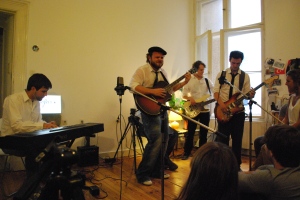
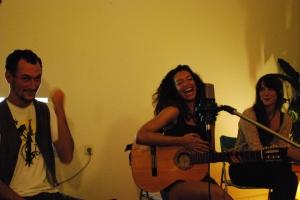
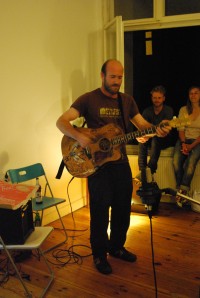
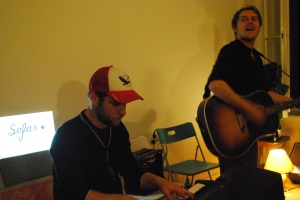
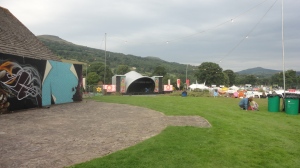
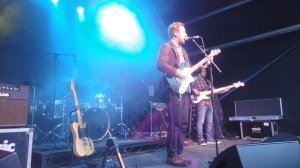
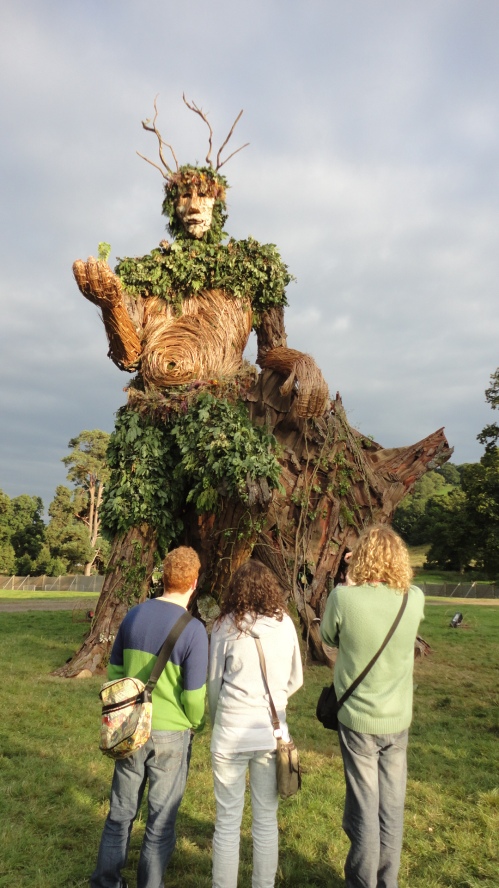
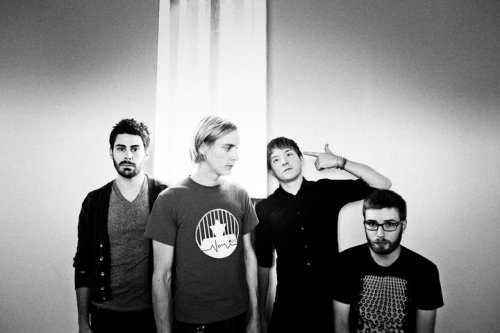
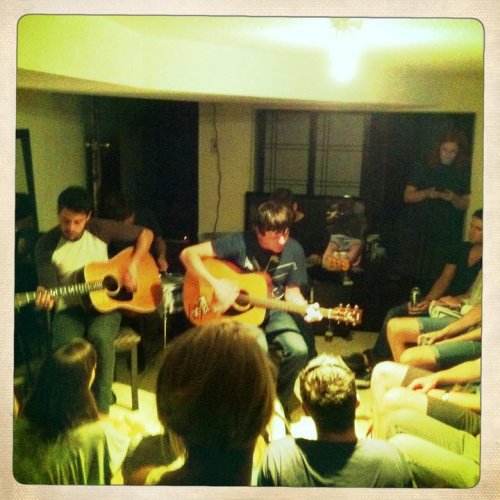
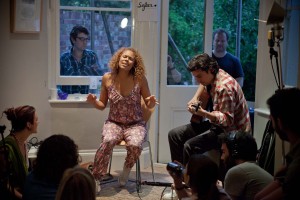
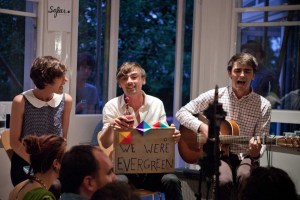
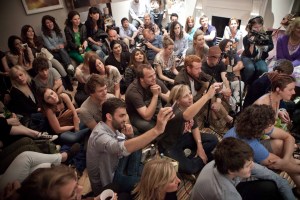
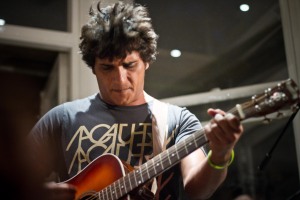
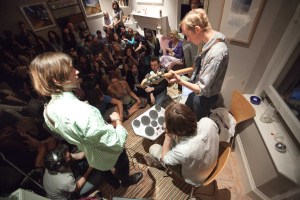
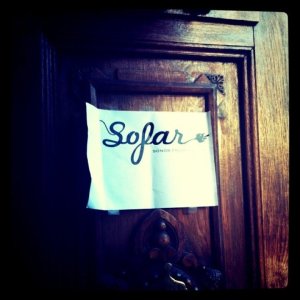
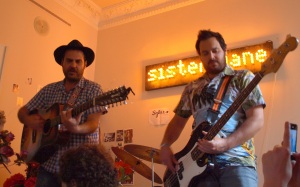
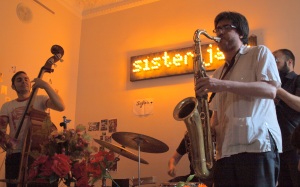
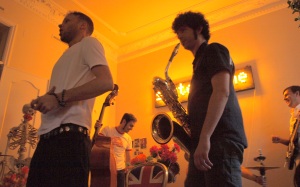
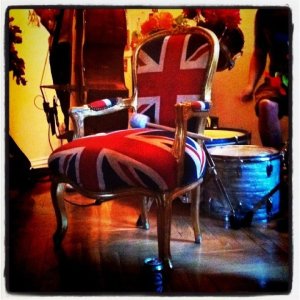
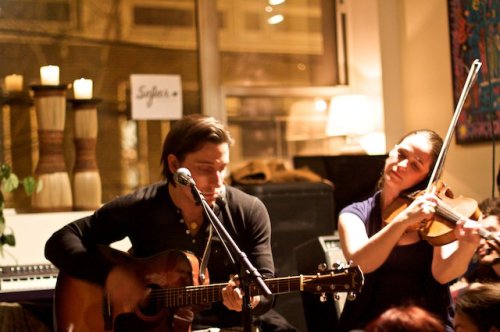
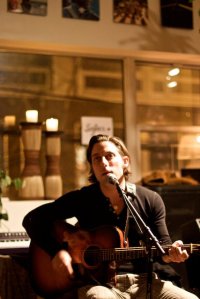
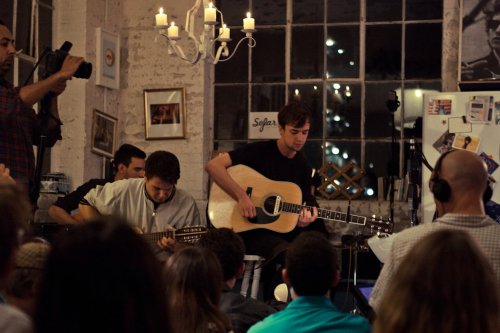
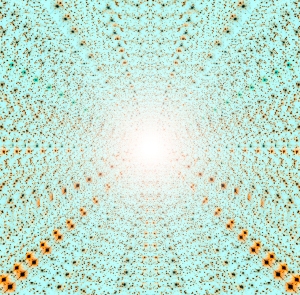
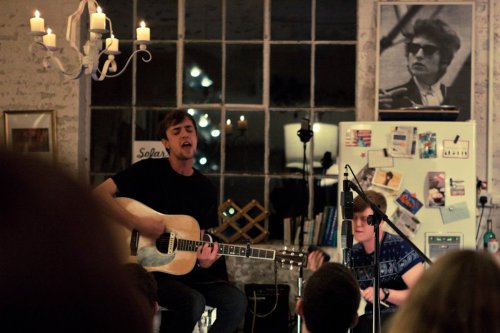
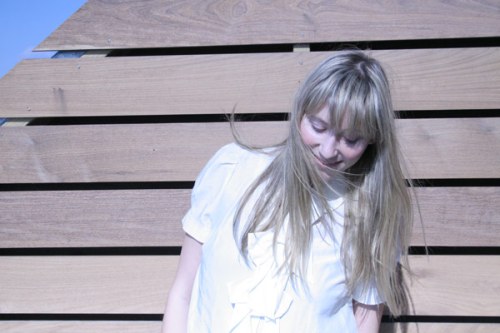
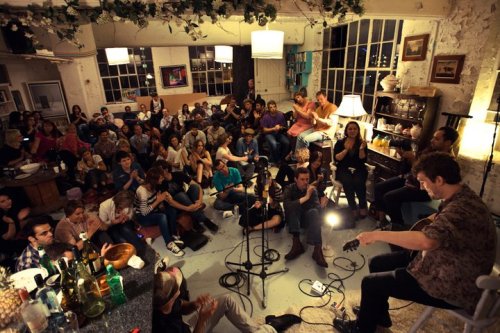
 Copyright © 2011 Sandra Ciampone
Copyright © 2011 Sandra Ciampone